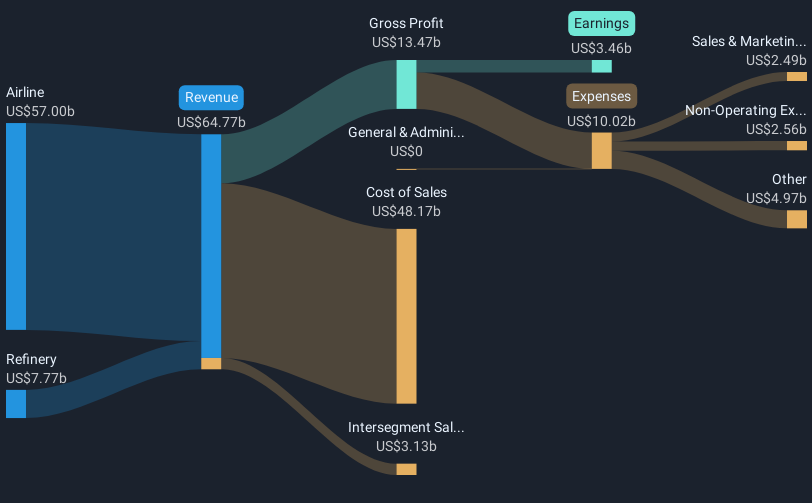Delta Air Lines (NYSE:DAL) Teams Up With JetZero: Stock Slides 16% Over Last Week
Delta Air Lines (NYSE:DAL) recently announced a collaboration with JetZero to develop a sustainable aircraft design. Despite this positive development, Delta's stock declined 16% last week. This may have been impacted by the broader market downturn, as the Dow Jones and Nasdaq entered correction and bear market territories due to escalating trade tensions following new tariffs announced by President Trump. The market's overall decline of 5.6% and fears of a global recession likely influenced Delta's share performance. While the JetZero partnership aligns with Delta's sustainability goals, these positive aspects did not shield the company from the market-wide sell-off.
We've identified 2 risks for Delta Air Lines that you should be aware of.

Delta Air Lines has achieved a total shareholder return of 61.60% over the past five years. This impressive performance spans across various market conditions, showcasing resilience despite recent challenges. Key events during this period include the launch of the Delta Concierge service and partnerships with YouTube and Uber, which aim to enhance customer loyalty. Additionally, in July 2024, Delta expanded its reach through a cooperation memorandum with Riyadh Air, intending to optimize route connectivity between North America and Saudi Arabia. Moreover, their commitment to sustainability was reinforced through the partnership with JetZero for developing a sustainable aircraft design.
Recent dividend increases, such as the 50% boost declared in June 2024, add an aspect of income growth for shareholders. However, threats remain, exemplified by a federal lawsuit linked to a crash in February 2025, and potential pressures from increased employee pay. Despite Delta's competitive edge through enhancing customer experiences and expanding its network, it underperformed compared to the US Airlines industry, which returned 1.2% over the past year.
This article by Simply Wall St is general in nature. We provide commentary based on historical data and analyst forecasts only using an unbiased methodology and our articles are not intended to be financial advice. It does not constitute a recommendation to buy or sell any stock, and does not take account of your objectives, or your financial situation. We aim to bring you long-term focused analysis driven by fundamental data. Note that our analysis may not factor in the latest price-sensitive company announcements or qualitative material. Simply Wall St has no position in any stocks mentioned.
Have feedback on this article? Concerned about the content? Get in touch with us directly. Alternatively, email editorial-team@simplywallst.com
 Wall Street Journal
Wall Street Journal